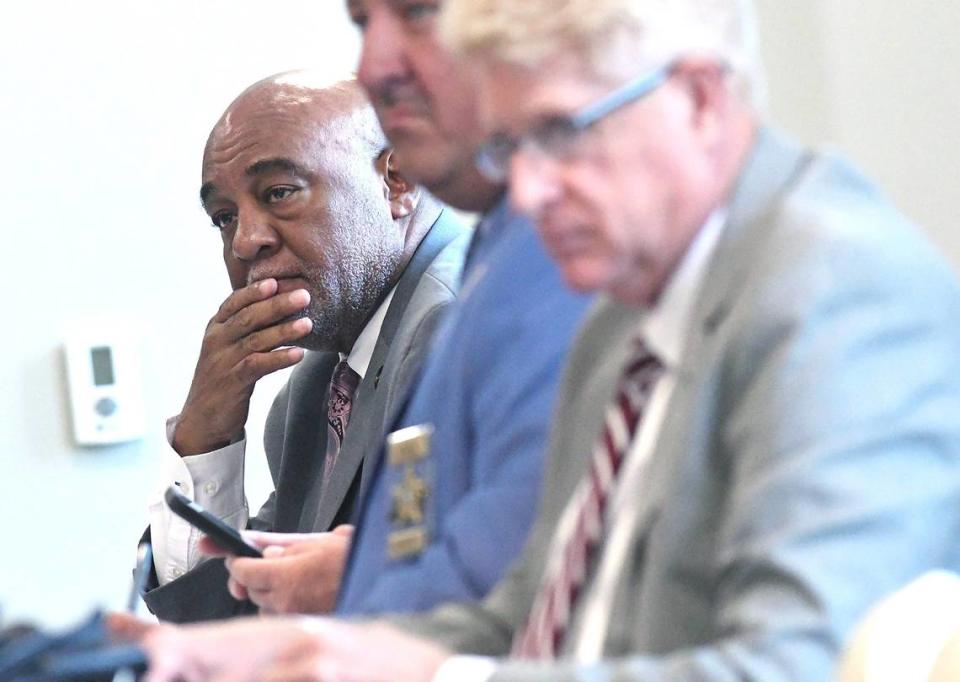NC bill would halt mandatory reports after prosecutors label officers as untrustworthy
At a time when the public is calling for more police accountability, two organizations are competing for control over the process that gives officers an often career-ending label of being untrustworthy.
A bill working its way through the General Assembly has lifted a curtain on a dispute between North Carolina criminal justice stakeholders. The disagreement could help officers deemed untrustworthy on the job land new positions in law enforcement, according to experts.
North Carolina’s Conference of District Attorneys and the Police Benevolent Association disagree about who should control a process intended to prevent cops with a history of bias, lying or fabricating evidence from testifying in court.
In its current form, House Bill 704 would repeal a section of a 2021 law that requiresofficials to tell state law enforcement commissions when a district attorney deems an officer or deputy untrustworthy to testify. The law requires officers, their employers, prosecutors and judges to report what are often called Giglio letters.
The bill, which passed in the House and has moved to the Senate, repeals a section of a law signed by Gov. Roy Cooper in September 2021. It was part of a bipartisan effort to identify and track bad cops and police use of excessive use of force, a priority for states across the country after the murder of George Floyd in 2020.

The proposed repeal of a portion of the law has vocal critics, including Dawn Blagrove, executive director of civil rights organization Emancipate NC, which is pushing for more criminal justice reform.
”This is disgraceful,” Blagrove said after a reporter informed her about the bill. She described it as a step back for criminal justice reform that decreased transparency about bad cops.
Rep. Joe John, a Raleigh Democrat, was a primary sponsor of initial versions of the bill, which gave officers a route to appealing Giglio designations. He removed his name because the bill now focuses on repealing notification requirements, he said.
Rep. Hugh Blackwell, a Burke County Republican and a primary sponsor in the House, didn’t respond to multiple requests for comments about the current language.
Gilgio letters
U.S. Supreme Court rulings since 1963 have required prosecutors to disclose relevant evidence that could raise questions about witnesses’ credibility, bias or motivation. That could include officers previously caught lying in a case or a witness who was offered immunity in exchange for testimony favoring the prosecution.
In some cases, district attorneys issue what are called Giglio letters to officers or their employers that outline what information would be disclosed if an officer testified in court. Sometimes the letters say the officers are deemed not credible and are barred from testifying in all cases in that jurisdiction.
The letters are often called “death letters” because they can be career ending.
The 2021 law requires officers, agencies and district attorneys to report the letters barring court testimony to one of two North Carolina law enforcement training commissions.
In 2022, 15 of those letters were reported, according to the first full-year tally report to a legislative oversight committee, also required by law.

Under the 2021 law, the Giglio letter is placed in an officers’ state certification file. The letters are shared with prospective law enforcement employers when an officer transfers to a new agency, as well as with district attorneys in those locations.
After a state certification agency receives a Giglio letter, the agency reviews the information, looking for violations of its rules. If violations are found, officers can face sanctions such as suspension or losing their certification.
Officers want powers to appeal
The initial version of the current bill, introduced in April, would have required that officers receive notice of a pending Gilgio letter and the opportunity to dispute it.
Backed by the Police Benevolent Association, which advocates for 16,000 officers in the state, the bill also created a process where officers could appeal their negative designation to superior court.
The earliest version of the bill, circumvented prosecutors’ responsibility mandated by the United States Supreme Court, said Conference of District Attorney executive director Kimberly Spahos. The responsibility includes seeking out and reporting whether a government’s witness suffers from lack of credibility, dishonesty and other issues that will affect their ability to testify, Spahos said.
The authority is given to prosecutors and prosecutors alone and doesn’t give superior court judges or anyone else the authority to preempt or overturn the decision to force someone to call a witness they don’t think is credible, she said.
The Police Benevolent Association disagrees with the conference’s stance on how far their authority extends, including the issuance of Giglio letters. The association is challenging officer Giglio designations in two cases working their way through state courts.
Under today’s political pressure to hold officers accountable, some district attorneys aren’t gathering all the facts before issuing the letter, association Executive Director John Midgette said. In other cases they are misapplying Giglio standards, or sending the letters in retaliation, he said.
Yet there is no way that officers can object to “this badge of infamy,” Midgette said.

Representatives from the sheriffs association and police chiefs association said they support due process for officers who receive Giglio letters that is consistent with the Supreme Court decisions.
Others are concerned
Representatives from the state sheriffs’ association and police chiefs association said they oppose repeal of the current law.
“I think everyone can agree that we don’t want bad actors wearing police uniforms,” said Hendersonville Police Chief Blair Myhand, president of the North Carolina Association of Chiefs of Police.
The NC Sheriffs’ Association supports the current law because it allows the commissions to identify problematic officers, said Eddie Caldwell, the group’s general counsel.
The law created a process that allowed officers to object to the Giglio designation and officials to review the allegations and determine whether the officer’s certifications should be suspended or revoked, he said.
The Police Benevolent Association representative Midgette said they don’t want to eliminate the opportunity to identify problematic officers, but want to give officers some due process in that system.
“We just want to have fairness in the system so good officers have the right be heard before their reputations is ruined,” he said.
The executive director of the North Carolina Conference of District Attorneys declined to take a stance on the current language in the bill.
“What I can tell you is we don’t support law enforcement officers that have credibility issues being able to move around the state and us not know about it,” Spahos said.
Virginia Bridges covers criminal justice in the Triangle and across North Carolina for The News & Observer. Her work is produced with financial support from the nonprofit The Just Trust. The N&O maintains full editorial control of its journalism.

